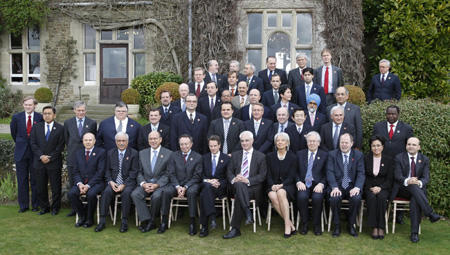| The Group of 20 (G20), consisting of both major advanced and emerging economies, has developed into a leading international platform for tackling the financial crisis, while the Group of Seven (G7), once dubbed a club of wealthy nations, struggles hard to stay relevant in a fast changing world.
|

]Finance ministers, central bank governors and heads of institutions pose for a family photograph during a break in the G20 Finance Ministers meeting at a hotel, near Horsham, in southern England March 14, 2009. [Agencies]
|
Analysts believe it has become increasingly hard for G7 to effectively coordinate global policy on dealing with the financial crisis in a world where emerging economies become more important in any talks about major global issues.
"Historically speaking, G7 used to play a constructive role in coordinating global policy," Hong Pingfan, principle economic affairs officer and chief for Global Economic Monitoring of the United Nations, told Xinhua.
"But with the world economic order shifting and the emerging economies rising, G7 has obviously lost its representativeness and is now being taken over by G20," he said.
G7 is comprised of the United States, Britain, France, Germany, Italy, Canada and Japan.
The organization was formed in the 1970s amid a series of international financial and economic crises to better coordinate economic policies among major advanced Western economies.
The organization became known as the Group of Eight (G8) after Russia joined it in 1998.
G7 has struggled for years to stay relevant in solving major world issues as the rising of the emerging economies has made it impossible for G7 to tackle any global economic and political issues all by itself.
The organization has repeatedly invited leaders of major emerging economies to attend its annual summits since 2005 when former British Prime Minister Tony Blair expanded G8 to G8+5 by including five emerging economies, namely, China, Brazil, India, Mexico and South Africa in its discussions.
The financial crisis has accelerated the transformation from G7 to a broader platform such as G20.
Advanced economies have been hit hard by the ongoing financial crisis while major emerging economies, with their sizable financial reserves, are widely believed to be the key to any global solution to the ongoing crisis though they are confronted with their own problems.
"More and more emerging economies have become closely involved in the global production chains as major providers of both manufactured goods and crucial energy resources," Zhang Bing, a senior researcher with the Chinese Academy of Social Sciences, told Xinhua.
"The relative power of traditional advanced economies is in decline as the importance of emerging economies grows steadily," said Zhang.
"Without the participation of major emerging economies, there is no way to talk about solving major global economic issues like the financial crisis," he added.
He noted that G20, with a broader representation of emerging economies, has the potential for playing a more constructive role than G7 in dealing with the financial crisis.
The Mexican La Jornada daily said in a recent article that the developments of the world geoeconomic order have made it clear the rising of the BRIC countries (Brazil, Russia, India and China) and Middle East oil exporting countries was inevitable and the decline of G7 is fated.
Brazilian Minister of Finance Guido Mantega said recently that G7 was no longer the leading platform for dealing with major world economic issues and the role of G20 should be strengthened.
G20 was set up in 1999 to better coordinate economic policies among major world economies after the Asian financial crisis in 1997 and 1998.
It groups not only such advanced economies as G7 members, EU and Australia, but also major emerging economies like China, Brazil, Russia, India, Mexico, Argentina, Turkey, South Africa, Saudi Arabia, South Korea and Indonesia.
G20 has largely been an informal platform for talks about world economic issues in the early years after its birth. The organization has no permanent secretariat and its meetings were at the ministerial level.
Its prominence has grown as the world urgently needs a broader platform to stave off the financial crisis after the US subprime mortgage crisis escalated into a full blown global financial turmoil in September 2008.
G20 held its first summit on November 15, 2008 in the United States. The second G20 summit is planned for April 4 in London.
Wang Hongmiao, another researcher with the Chinese Academy of Social Sciences, told Xinhua that the trend for G20 to take over G7 as the leading international forum for discussing major world economic issues has reflected the new order of the global economic powers.
"G7 has played a dominating role in making crucial global economic decisions in the past 30 years or so, but with the rising of the BRIC countries, there has a gradual shift in global economic powers," he said.
(Xinhua News Agency March 28, 2009) | 